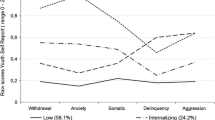Abstract
The present study examined developmental changes in forms of peer victimization and longitudinal associations between forms of peer victimization and internalizing problems among Japanese adolescents. Participants were 271 students (Time 1 M age = 12.72, SD = 0.45, 50% girls) from 9 classrooms and 2 public middle schools in Japan. Data were collected at five time points from 7th to 9th grade. Growth curve modeling (GCM) of mean changes indicated that relational victimization and internalizing problems decreased over three school years. Overt victimization first decreased and then remained relatively constant toward the end of the assessment. In addition, the results of the Random Intercept Cross-Lagged Panel Model (RI-CLPM) indicated that the random intercept of relational victimization was positively and strongly correlated with that of internalizing problems. Although the random intercept of overt victimization was positively correlated with that of internalizing problems, the effect size was small to moderate. In general, there were no significant within-person changes between relational and overt victimization and internalizing problems. However, some exceptions were noted towards the end of middle school, such that higher relational victimization was associated with increases in internalizing problems, which in turn led to more relational victimization. There were no gender differences in the above trajectories or in the transactional models. The findings regarding at-risk youth who are vulnerable to relational and overt victimization are discussed from clinical, cultural, and developmental perspectives.



Similar content being viewed by others
Data Availability
Data are available upon request.
References
Achenbach, T. M. (2019). International findings with the Achenbach system of empirically based assessment (ASEBA): Applications to clinical services, research, and training. Child and Adolescent Psychiatry and Mental Health, 13(1), 1–10. https://doi.org/10.1186/s13034-019-0291-2
Achenbach, T. M., & Rescorla, L. A. (2001). Manual for the ASEBA School-age Forms & Profiles. University of Vermont, Research Center for Children, Youth, & Families.
Calhoun, C. D., Helms, S. W., Heilbron, N., Rudolph, K. D., Hastings, P. D., & Prinstein, M. J. (2014). Relational victimization, friendship, and adolescents’ hypothalamic–pituitary–adrenal axis responses to an in vivo social stressor. Development and Psychopathology, 26(3), 605–618. https://doi.org/10.1017/S0954579414000261
Casper, D. M., & Card, N. A. (2017). Overt and relational victimization: A meta-analytic review of their overlap and associations with social-psychological adjustment. Child Development, 88(2), 466–483. https://doi.org/10.1111/cdev.12621
Causadias, J. M. (2013). A roadmap for the integration of culture into developmental psychopathology. Development and Psychopathology, 25(4), 1375–1398. https://doi.org/10.1017/S0954579413000679
Cho, D., Zatto, B. R. L., & Hoglund, W. L. G. (2022). Forms of peer victimization in adolescence: Covariation with symptoms of depression. Developmental Psychology, 58(2), 392–404. https://doi.org/10.1037/dev0001300
Christina, S., Magson, N. R., Kakar, V., & Rapee, R. M. (2021). The bidirectional relationships between peer victimization and internalizing problems in school-aged children: An updated systematic review and meta-analysis. Clinical Psychology Review, 85, 101979. https://doi.org/10.1016/j.cpr.2021.101979
Cohen, J. (2016). A power primer. In A. E. Kazdin (Ed.), Methodological issues and strategies in clinical research (pp. 279–284). American Psychological Association. https://doi.org/10.1037/14805-018
Crick, N. R., & Bigbee, M. A. (1998). Relational and overt forms of peer victimization: A multiinformant approach. Journal of Consulting and Clinical Psychology, 66(2), 337–347. https://doi.org/10.1037/0022-006X.66.2.337
Crick, N. R., & Grotpeter, J. K. (1996). Children’s treatment by peers: Victims of relational and overt aggression. Development and Psychopathology, 8(2), 367–380. https://doi.org/10.1017/S0954579400007148
Davies, R. J., & Ikeno, O. (2002). The Japanese mind: Understanding contemporary Japanese culture. Tuttle Pub.
Farrell, A. D., Goncy, E. A., Sullivan, T. N., & Thompson, E. L. (2018). Victimization, aggression, and other problem behaviors: Trajectories of change within and across middle school grades. Journal of Research on Adolescence, 28(2), 438–455. https://doi.org/10.1111/jora.12346
Fite, P. J., Gabrielli, J., Cooley, J. L., Rubens, S. L., Pederson, C. A., & Vernberg, E. M. (2016). Associations between physical and relational forms of peer aggression and victimization and risk for substance use among elementary school-age youths. Journal of Child & Adolescent Substance Abuse, 25(1), 1–10. https://doi.org/10.1080/1067828X.2013.872589
Funabiki, Y., & Murai, T. (2017). Standardization of a Japanese version of the youth self-report for school ages 11-18. Japanese journal of child and adolescent. Psychiatry, 58(5), 730–741. https://doi.org/10.20615/jscap.58.5_730
Giesbrecht, G. F., Leadbeater, B. J., & MacDonald, S. W. (2011). Child and context characteristics in trajectories of physical and relational victimization among early elementary school children. Development and Psychopathology, 23(1), 239–252. https://doi.org/10.1017/S0954579410000763
Hamamura, T. (2012). Are cultures becoming individualistic? A cross-temporal comparison of individualism–collectivism in the United States and Japan. Personality and Social Psychology Review, 16(1), 3–24. https://doi.org/10.1177/1088868311411587
Hankin, B. L., Stone, L., & Wright, P. A. (2010). Corumination, interpersonal stress generation, and internalizing symptoms: Accumulating effects and transactional influences in a multiwave study of adolescents. Development and Psychopathology, 22(1), 217–235. https://doi.org/10.1017/S0954579409990368
Hu, L.-T., & Bentler, P. M. (1999). Cutoff criteria for fit indexes in covariance structure analysis: Conventional criteria versus new alternatives. Structural Equation Modeling, 6(1), 1–55. https://doi.org/10.1080/10705519909540118
Kawabata, Y. (2018). Cultural contexts of relational aggression. In S. M. Coyne & J. M. Ostrov (Eds.), The development of relational aggression (pp. 265–280). Oxford University Press.
Kawabata, Y. (2020). Measurement of peer and friend relational and physical victimization among early adolescents. Journal of Adolescence, 82(1), 82–85. https://doi.org/10.1016/j.adolescence.2020.05.004
Kawabata, Y., Crick, N. R., & Hamaguchi, Y. (2010). Forms of aggression, social-psychological adjustment, and peer victimization in a Japanese sample: The moderating role of positive and negative friendship quality. Journal of Abnormal Child Psychology, 38(4), 471–484. https://doi.org/10.1007/s10802-010-9386-1
Kawabata, Y., Tseng, W. L., & Crick, N. R. (2014). Mechanisms and processes of relational and physical victimization, depressive symptoms, and children's relational-interdependent self-construals: Implications for peer relationships and psychopathology. Development and Psychopathology, 26(3), 619–634. https://doi.org/10.1017/S0954579414000273
Le Tendre, G. K., & Fukuzawa, R. E. (2001). Intense years: How Japanese adolescents balance school, family and friends. Routledge.
Little, R. J. (1988). A test of missing completely at random for multivariate data with missing values. Journal of the American Statistical Association, 83(404), 1198–1202. https://doi.org/10.1080/01621459.1988.10478722
Marsh, H. W., Craven, R. G., Parker, P. D., Parada, R. H., Guo, J., Dicke, T., & Abduljabbar, A. S. (2016). Temporal ordering effects of adolescent depression, relational aggression, and victimization over six waves: Fully latent reciprocal effects models. Developmental Psychology, 52(12), 1994. https://doi.org/10.1037/dev0000241
Meeus, W. (2016). Adolescent psychosocial development: A review of longitudinal models and research. Developmental Psychology, 52(12), 1969–1993. https://doi.org/10.1037/dev0000243
Ministry of Health, Labour and Welfare. (2020). Considering social security and work styles in Reiwa [White paper]. https://www.mhlw.go.jp/content/000735866.pdf
Murayama, Y., Ito, H., Hamada, M., Nakajima, S., Noda, W., Katagiri, M., Takayanagi, N., Tanaka, Y., & Tsujii, M. (2015). Relationships of bullying behaviors and peer victimization with internalizing/externalizing problems. The Japanese Journal of Developmental Psychology, 26, 13–22.
Muthén, L. K., & Muthén, B. (1998-2017). Mplus User’s Guide. Muthén & Muthén.
Orpinas, P., McNicholas, C., & Nahapetyan, L. (2015). Gender differences in trajectories of relational aggression perpetration and victimization from middle to high school. Aggressive Behavior, 41(5), 401–412. https://doi.org/10.1002/ab.21563
Ostrov, J. M., & Godleski, S. A. (2013). Relational aggression, victimization, and adjustment during middle childhood. Development and Psychopathology, 25(3), 801–815. https://doi.org/10.1017/S0954579413000187
Ostrov, J. M., & Kamper, K. E. (2015). Future directions for research on the development of relational and physical peer victimization. Journal of Clinical Child and Adolescent Psychology, 44(3), 509–519. https://doi.org/10.1080/15374416.2015.1012723
Osuka, Y., Nishimura, T., Wakuta, M., Takei, N., & Tsuchiya, K. J. (2019). Reliability and validity of the Japan Ijime scale and estimated prevalence of bullying among fourth through ninth graders: A large-scale school-based survey. Psychiatry and Clinical Neurosciences, 73(9), 551–559. https://doi.org/10.1111/pcn.12864
Pagliaccio, D., Kumar, P., Kamath, R. A., Pizzagalli, D. A., & Auerbach, R. P. (2023). Neural sensitivity to peer feedback and depression symptoms in adolescents: A 2-year multiwave longitudinal study. Journal of Child Psychology and Psychiatry, 64(2), 254–264. https://doi.org/10.1111/jcpp.13690
Pozzoli, T., & Gini, G. (2010). Active defending and passive bystanding behavior in bullying: The role of personal characteristics and perceived peer pressure. Journal of Abnormal Child Psychology, 38(6), 815–827. https://doi.org/10.1007/s10802-010-9399-9
Prinstein, M. J., & Giletta, M. (2020). Future directions in peer relations research. Journal of Clinical Child and Adolescent Psychology, 49(4), 556–572. https://doi.org/10.1080/15374416.2020.1756299
Prinstein, M. J., Boergers, J., & Vernberg, E. M. (2001). Overt and relational aggression in adolescents: Social–psychological adjustment of aggressors and victims. Journal of Clinical Child and Adolescent Psychology, 30(4), 479–491. https://doi.org/10.1207/S15374424JCCP3004_05
Rose, A. J., & Rudolph, K. D. (2006). A review of sex differences in peer relationship processes: Potential trade-offs for the emotional and behavioral development of girls and boys. Psychological Bulletin, 132(1), 98–131. https://doi.org/10.1037/0033-2909.132.1.98
Rudolph, K. D., Flynn, M., & Abaied, J. L. (2008). A developmental perspective on interpersonal theories of youth depression. In J. R. Z. Abela & B. L. Hankin (Eds.), Handbook of depression in children and adolescents (pp. 79–102). The Guilford Press.
Sentse, M., Prinzie, P., & Salmivalli, C. (2017). Testing the direction of longitudinal paths between victimization, peer rejection, and different types of internalizing problems in adolescence. Journal of Abnormal Child Psychology, 45(5), 1013–1023. https://doi.org/10.1007/s10802-016-0216-y
Smetana, J. G., Robinson, J., & Rote, W. M. (2015). Socialization in adolescence. In J. E. Grusec & P. D. Hastings (Eds.), Handbook of socialization: Theory and research (pp. 60–84). The Guilford Press.
Syed, M., & Kathawalla, U. K. (2022). Cultural psychology, diversity, and representation in open science. In K. C. McLean (Ed.), Cultural methods in psychology: Describing and transforming cultures (pp. 427–454). Oxford University Press.
Tampke, E. C., Blossom, J. B., & Fite, P. J. (2019). The role of sleep quality in associations between peer victimization and internalizing symptoms. Journal of Psychopathology and Behavioral Assessment, 41, 25–35. https://doi.org/10.1007/s10862-018-9700-8
Toda, Y. (2016). Bullying (Ijime) and related problems in Japan: History and research. In P. K. Smith, K. Kwak, & Y. Toda (Eds.), School bullying in different cultures: Eastern and Western perspectives (pp. 73–92). Cambridge University Press.
Tran, C. V., Cole, D. A., & Weiss, B. (2012). Testing reciprocal longitudinal relations between peer victimization and depressive symptoms in young adolescents. Journal of Clinical Child and Adolescent Psychology, 41(3), 353–360. https://doi.org/10.1080/15374416.2012.662674
Umezu, N., Arai, K., & Hamaguchi, Y. (2012). The relationships between relational aggression, cognitive characteristics and adjustment in Japanese junior-high school students: Focusing on hostile attribution. Tsukuba Psychological Research, 44, 69–78.
Will, G. J., van Lier, P. A., Crone, E. A., & Güroğlu, B. (2016). Chronic childhood peer rejection is associated with heightened neural responses to social exclusion during adolescence. Journal of Abnormal Child Psychology, 44, 43–55. https://doi.org/10.1007/s10802-015-9983-0
Williford, A., Fite, P. J., Isen, D., & Poquiz, J. (2019). Associations between peer victimization and school climate: The impact of form and the moderating role of gender. Psychology in the Schools, 56(8), 1301–1317. https://doi.org/10.1002/pits.22278
Author information
Authors and Affiliations
Contributions
All authors made substantial contributions to the present study.
Corresponding author
Ethics declarations
Funding
This study was funded by the Japan Society for the Promotion of Science Grant-in-Aid for Early-Career Scientists (16 K17323).
Conflict of Interest
The authors have no competing interests to declare that are relevant to the content of this article.
Ethical Approval
All procedures performed in studies involving human participants were in accordance with the ethical standards of the institutional and/or national research committee and with the 1964 Helsinki Declaration and its later amendments or comparable ethical standards. The study was approved by Konan University’s Institutional Review Board.
Informed Consent
Informed consent or assent was obtained from all individual participants included in the study. Parental consent was sought under the guidance of schools. Consent from school principals was also obtained. This procedure was approved by the authors’ IRB.
Additional information
Publisher’s Note
Springer Nature remains neutral with regard to jurisdictional claims in published maps and institutional affiliations.
Supplementary Information
ESM 1
Figure S1, S2 and Table S1 (DOCX 290 kb)
Rights and permissions
Springer Nature or its licensor (e.g. a society or other partner) holds exclusive rights to this article under a publishing agreement with the author(s) or other rightsholder(s); author self-archiving of the accepted manuscript version of this article is solely governed by the terms of such publishing agreement and applicable law.
About this article
Cite this article
Kawabata, Y., Kinoshita, M. & Onishi, A. A Longitudinal Study of Forms of Peer Victimization and Internalizing Problems in Adolescence. Res Child Adolesc Psychopathol (2024). https://doi.org/10.1007/s10802-023-01155-9
Accepted:
Published:
DOI: https://doi.org/10.1007/s10802-023-01155-9




